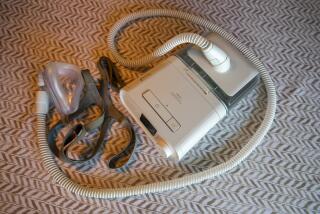Irvine Firm Ordered to Warn Valve Recipients About Defects : Health: The FDA directed Shiley Inc. to notify 350 people implanted with mechanical heart devices that may possibly fracture.
- Share via
IRVINE — Federal health officials have ordered Shiley Inc. to send special notices to about 350 recipients of mechanical heart valves worldwide who may have been implanted with the potentially defective devices.
Under pressure from lawsuits and the Food and Drug Administration, the Irvine-based subsidiary of drug and medical giant Pfizer Inc. began a program in December, 1990, to directly notify valve recipients about possible life-threatening fractures of the devices. But in a letter sent to Shiley officials last week, the FDA directed Shiley to give priority notice to people who received a certain group of valves manufactured between February, 1981, and May, 1982.
The company estimates that 520 people were implanted with valves that were among those manufactured during that period, about 350 of whom are still living. Of that number, 130 are believed to reside in the United States with the others living overseas.
The FDA letter disclosed that a single employee may have been involved in part of the production of the particular group of valves. The employee is not identified by name but only as “Employee 2832.”
“Cracked valves purportedly welded or rewelded by Employee 2832 in fact were not so processed, but were apparently polished or otherwise cosmetically finished, thus resulting in valves with patent defects more likely to cause heart-valve fractures,” the letter states.
Robert Fauteux, a Shiley spokesman, said the company discovered last year that the employee number was associated with the group of valves. But a company investigation found that, although the number 2832 appears in production records, it was never issued to an employee. The company has not been able to determine how or why that number was used.
Shiley said it does not believe that patients who received the special group of valves are at greater risk of a rupture than other recipients of the Bjork-Shiley valves. But the FDA said the group of valves has a fracture rate about twice as great--0.06% or six in 10,000 per year--as the other valves.
About 82,000 people worldwide were implanted with Bjork-Shiley valves. As of January, 313 ruptures of the valve had been reported to the FDA, resulting in 204 deaths. Shiley, which voluntarily stopped making the valves in 1986, has argued that the threat of failure is slim and that the risks of replacing the valve--without an actual fracture--are too great to undertake.
Shiley has contracted with Medic Alert Foundation International, a Turlock, Calif.-based nonprofit organization, to find the estimated 55,000 valve recipients who are still living. Once contacted, the recipients would be told of the symptoms of a heart-valve malfunction. There is some evidence that valve-fracture victims’ lives can be saved if the problem is diagnosed in time.
Shiley said it has spent $2 million trying to find U.S. recipients alone.
More to Read
Inside the business of entertainment
The Wide Shot brings you news, analysis and insights on everything from streaming wars to production — and what it all means for the future.
You may occasionally receive promotional content from the Los Angeles Times.










